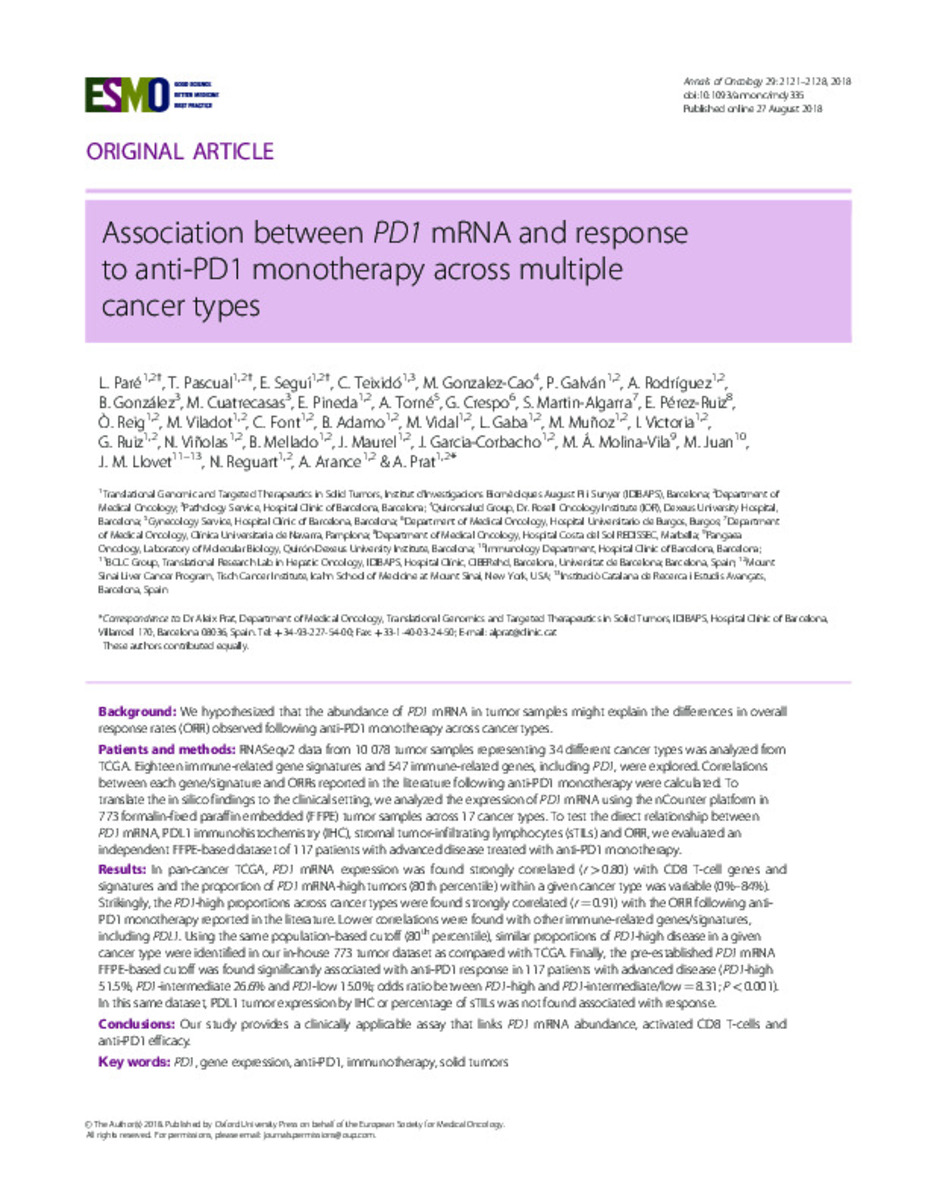Full metadata record
| DC Field | Value | Language |
|---|---|---|
| dc.creator | Paré, L. (L.) | - |
| dc.creator | Pascual, T. (T.) | - |
| dc.creator | Seguí, E. (E.) | - |
| dc.creator | Teixidó, C. (Cristina) | - |
| dc.creator | Gonzalez-Cao, M. (María) | - |
| dc.creator | Galván, P. (P.) | - |
| dc.creator | Rodríguez, A. (A.) | - |
| dc.creator | González, B. (B.) | - |
| dc.creator | Cuatrecasas, M. (M.) | - |
| dc.creator | Pineda, E. (E.) | - |
| dc.creator | Torné, A. (A.) | - |
| dc.creator | Crespo, G. (Guillermo) | - |
| dc.creator | Martin-Algarra, S. (Salvador) | - |
| dc.creator | Perez-Ruiz, E. (Elisabeth) | - |
| dc.creator | Reig, Ó. (Ó.) | - |
| dc.creator | Viladot, M. (M.) | - |
| dc.creator | Font, C. (C.) | - |
| dc.creator | Adamo, B. (B.) | - |
| dc.creator | Vidal, M. (M.) | - |
| dc.creator | Gaba, L. (L.) | - |
| dc.creator | Muñoz, M. (M.) | - |
| dc.creator | Victoria, I. (I.) | - |
| dc.creator | Ruiz, G. (G.) | - |
| dc.creator | Viñolas, N. (N.) | - |
| dc.creator | Mellado, B. (B.) | - |
| dc.creator | Maurel, J. (J.) | - |
| dc.creator | Garcia-Corbacho, J. (J.) | - |
| dc.creator | Molina-Vila, M.A. (Miguel Angel) | - |
| dc.creator | Juan, M. (Manel) | - |
| dc.creator | Llovet, J.M. (J. M.) | - |
| dc.creator | Reguart, N. (Noemi) | - |
| dc.creator | Arance, A. (Ana) | - |
| dc.creator | Prat, A. (A.) | - |
| dc.date.accessioned | 2023-03-09T08:06:00Z | - |
| dc.date.available | 2023-03-09T08:06:00Z | - |
| dc.date.issued | 2018 | - |
| dc.identifier.citation | Paré, L. (L.); Pascual, T. (T.); Seguí, E. (E.); et al. "Association between PD1 mRNA and response to anti-PD1 monotherapy across multiple cancer types". Annals of oncology. 29 (10), 2018, 2121 - 2128 | es |
| dc.identifier.issn | 0923-7534 | - |
| dc.identifier.uri | https://hdl.handle.net/10171/65644 | - |
| dc.description.abstract | Background: We hypothesized that the abundance of PD1 mRNA in tumor samples might explain the differences in overall response rates (ORR) observed following anti-PD1 monotherapy across cancer types. Patients and methods: RNASeqv2 data from 10 078 tumor samples representing 34 different cancer types was analyzed from TCGA. Eighteen immune-related gene signatures and 547 immune-related genes, including PD1, were explored. Correlations between each gene/signature and ORRs reported in the literature following anti-PD1 monotherapy were calculated. To translate the in silico findings to the clinical setting, we analyzed the expression of PD1 mRNA using the nCounter platform in 773 formalin-fixed paraffin embedded (FFPE) tumor samples across 17 cancer types. To test the direct relationship between PD1 mRNA, PDL1 immunohistochemistry (IHC), stromal tumor-infiltrating lymphocytes (sTILs) and ORR, we evaluated an independent FFPE-based dataset of 117 patients with advanced disease treated with anti-PD1 monotherapy. Results: In pan-cancer TCGA, PD1 mRNA expression was found strongly correlated (r > 0.80) with CD8 T-cell genes and signatures and the proportion of PD1 mRNA-high tumors (80th percentile) within a given cancer type was variable (0%–84%). Strikingly, the PD1-high proportions across cancer types were found strongly correlated (r ¼ 0.91) with the ORR following antiPD1 monotherapy reported in the literature. Lower correlations were found with other immune-related genes/signatures, including PDL1. Using the same population-based cutoff (80th percentile), similar proportions of PD1-high disease in a given cancer type were identified in our in-house 773 tumor dataset as compared with TCGA. Finally, the pre-established PD1 mRNA FFPE-based cutoff was found significantly associated with anti-PD1 response in 117 patients with advanced disease (PD1-high 51.5%, PD1-intermediate 26.6% and PD1-low 15.0%; odds ratio between PD1-high and PD1-intermediate/low ¼ 8.31; P < 0.001). In this same dataset, PDL1 tumor expression by IHC or percentage of sTILs was not found associated with response. Conclusions: Our study provides a clinically applicable assay that links PD1 mRNA abundance, activated CD8 T-cells and anti-PD1 efficacy. | es_ES |
| dc.description.sponsorship | This project was partially sponsored by the Instituto de Salud Carlos III (ISCIII) through the Plan Estatal de Investigacio´ n Cientı´fica y Te´cnica y de Innovacio´ n 2013–2016, project reference number PI16/00904 (to AP), Spanish Society of Medical Oncology Immuno-oncology Grant - 40 Aniversario FSEOM (to AP; no grant numbers apply), Banco Bilbao Vizcaya Argentaria Foundation (to AP; no grant numbers apply), Pas a Pas amb el Ca´ncer de Mama (to AP; no grant numbers apply), Save the Mama (to AP; no grant numbers apply) and the Breast Cancer Research Foundation (to AP; no grant numbers apply). | es_ES |
| dc.language.iso | eng | es_ES |
| dc.publisher | Elsevier BV | es_ES |
| dc.relation | info:eu-repo/grantAgreement/MINECO/Proyectos de investigación en salud (Modalidad Proyectos de investigación en salud) (AE Salud 2016)/PI16/00904/ES/DOBLE BLOQUE HER2 SIN QUIMIOTERAPIA EN CÁNCER DE MAMA PRECOZ HER2+ | es_ES |
| dc.rights | info:eu-repo/semantics/openAccess | es_ES |
| dc.subject | PD1 | es_ES |
| dc.subject | Gene expression | es_ES |
| dc.subject | Anti-PD1 | es_ES |
| dc.subject | Immunotherapy | es_ES |
| dc.subject | Solid tumors | es_ES |
| dc.title | Association between PD1 mRNA and response to anti-PD1 monotherapy across multiple cancer types | es_ES |
| dc.type | info:eu-repo/semantics/article | es_ES |
| dc.identifier.doi | 10.1093/annonc/mdy335 | - |
| dadun.citation.endingPage | 2128 | es_ES |
| dadun.citation.number | 10 | es_ES |
| dadun.citation.publicationName | Annals of oncology | es_ES |
| dadun.citation.startingPage | 2121 | es_ES |
| dadun.citation.volume | 29 | es_ES |
Files in This Item:
Statistics and impact
Items in Dadun are protected by copyright, with all rights reserved, unless otherwise indicated.






